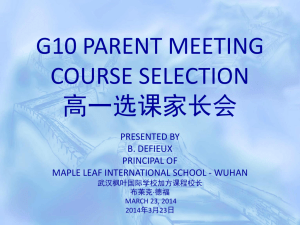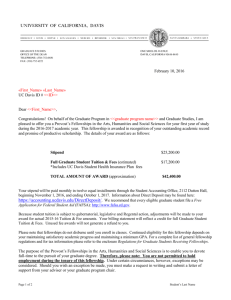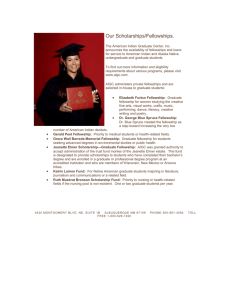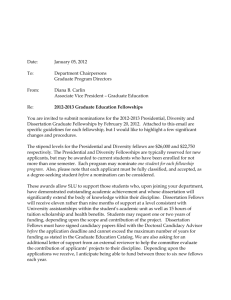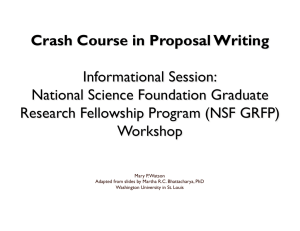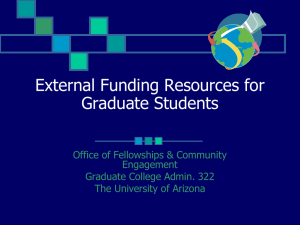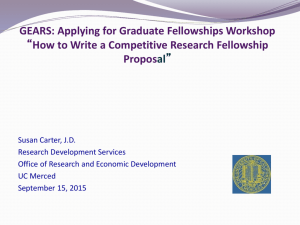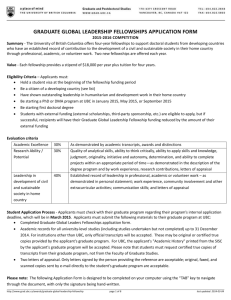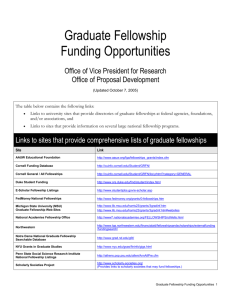CC`s Information Sheet
advertisement
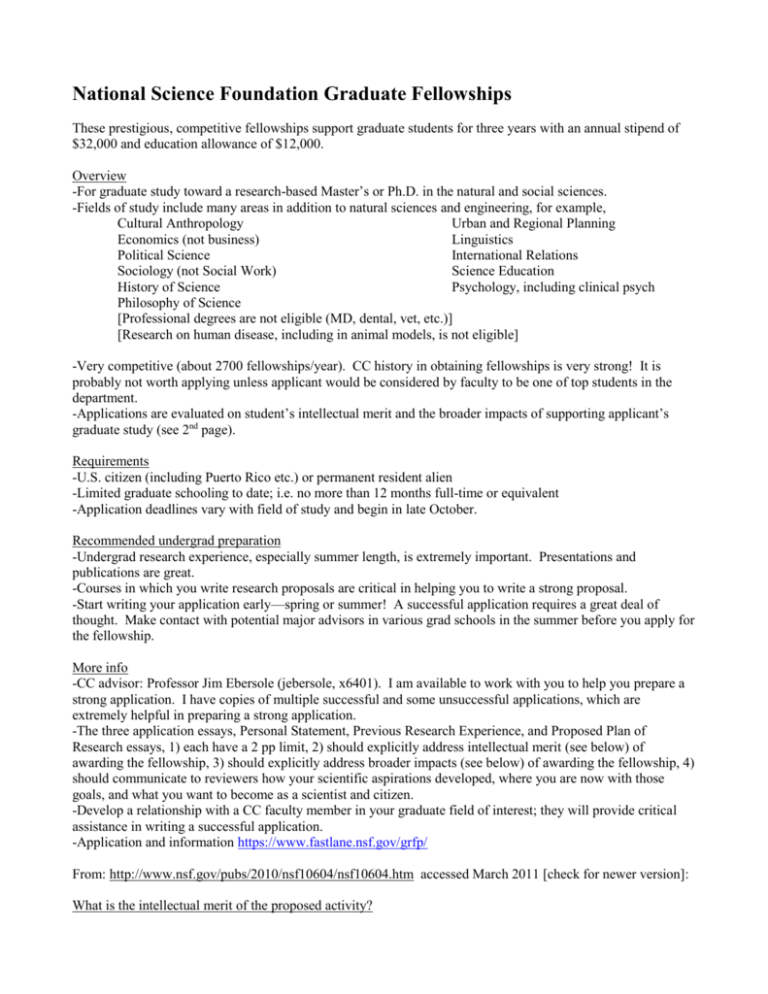
National Science Foundation Graduate Fellowships These prestigious, competitive fellowships support graduate students for three years with an annual stipend of $32,000 and education allowance of $12,000. Overview -For graduate study toward a research-based Master’s or Ph.D. in the natural and social sciences. -Fields of study include many areas in addition to natural sciences and engineering, for example, Cultural Anthropology Urban and Regional Planning Economics (not business) Linguistics Political Science International Relations Sociology (not Social Work) Science Education History of Science Psychology, including clinical psych Philosophy of Science [Professional degrees are not eligible (MD, dental, vet, etc.)] [Research on human disease, including in animal models, is not eligible] -Very competitive (about 2700 fellowships/year). CC history in obtaining fellowships is very strong! It is probably not worth applying unless applicant would be considered by faculty to be one of top students in the department. -Applications are evaluated on student’s intellectual merit and the broader impacts of supporting applicant’s graduate study (see 2nd page). Requirements -U.S. citizen (including Puerto Rico etc.) or permanent resident alien -Limited graduate schooling to date; i.e. no more than 12 months full-time or equivalent -Application deadlines vary with field of study and begin in late October. Recommended undergrad preparation -Undergrad research experience, especially summer length, is extremely important. Presentations and publications are great. -Courses in which you write research proposals are critical in helping you to write a strong proposal. -Start writing your application early—spring or summer! A successful application requires a great deal of thought. Make contact with potential major advisors in various grad schools in the summer before you apply for the fellowship. More info -CC advisor: Professor Jim Ebersole (jebersole, x6401). I am available to work with you to help you prepare a strong application. I have copies of multiple successful and some unsuccessful applications, which are extremely helpful in preparing a strong application. -The three application essays, Personal Statement, Previous Research Experience, and Proposed Plan of Research essays, 1) each have a 2 pp limit, 2) should explicitly address intellectual merit (see below) of awarding the fellowship, 3) should explicitly address broader impacts (see below) of awarding the fellowship, 4) should communicate to reviewers how your scientific aspirations developed, where you are now with those goals, and what you want to become as a scientist and citizen. -Develop a relationship with a CC faculty member in your graduate field of interest; they will provide critical assistance in writing a successful application. -Application and information https://www.fastlane.nsf.gov/grfp/ From: http://www.nsf.gov/pubs/2010/nsf10604/nsf10604.htm accessed March 2011 [check for newer version]: What is the intellectual merit of the proposed activity? How important is the proposed activity to advancing knowledge and understanding within its own field or across different fields? How well qualified is the proposer (individual or team) to conduct the project? (If appropriate, the reviewer will comment on the quality of prior work.) To what extent does the proposed activity suggest and explore creative, original, or potentially transformative concepts? How well conceived and organized is the proposed activity? Is there sufficient access to resources? If international activities are proposed, are the proposed activities relevant and do they benefit the applicant? For example, panelists may consider the following with respect to the Intellectual Merit Criterion: the strength of the academic record, the proposed plan of research, the description of previous research experience or publication/presentations, references, and the appropriateness of the choice of institution relative to the proposed plan for graduate education and research. What are the broader impacts of the proposed activity? How well does the activity advance discovery and understanding while promoting teaching, training, and learning? How well does the proposed activity broaden the participation of underrepresented groups (e.g., gender, ethnicity, disability, geographic, etc.)? To what extent will it enhance the infrastructure for research and education, such as facilities, instrumentation, networks, and partnerships? Will the results be disseminated broadly to enhance scientific and technological understanding? What may be the benefits of the proposed activity to society? Background information and examples of Broader Impacts activities are available at http://www.nsf.gov/pubs/gpg/broaderimpacts.pdf For example, panelists may consider the following with respect to the Broader Impacts Criterion: the personal, professional, and educational experiences, the future plans and prior accomplishments in the integration of research and education, and the potential to reach diverse audiences and benefit society. Other related graduate fellowships NDSEG—National Defense Science and Engineering Graduate Fellowship About 200 fellowships per year. 3 yr. $30,500-31,500/year. Apps open in September. Citizen of US or possessions; apply before or in first two yr of grad school Fields: engineering, natural sciences, behavioral sciences, computer science, math. Research does not need to directly apply to defense. http://ndseg.asee.org/ EPA Star 2 (MA) or 3 yr (PhD). Environmental fields of study. $25,000 living + $5,000 expenses. About 80 fellowships US citizens or residents; apply before or during grad school. Deadline: end of November http://epa.gov/ncer/guidance/faqs/faq_gro_grad.html#01 DOE Office of Science Graduate Fellowship 3 years. $35,000 + 5,000 expenses. Computation oriented. Fields: physics, biology (non-medical), chemistry, mathematics, engineering, computer and computational sciences, and environmental sciences US citizens; seniors or first or second year grad students Apps due early January. http://scgf.orau.gov/ 2015 January NSF Grad Res Fell info

